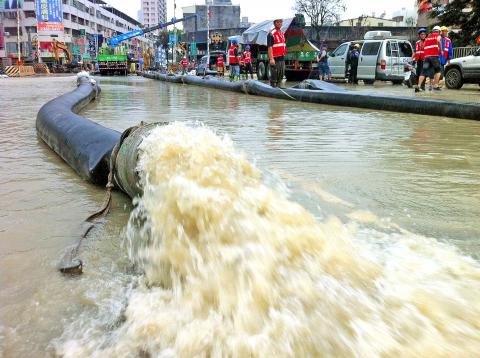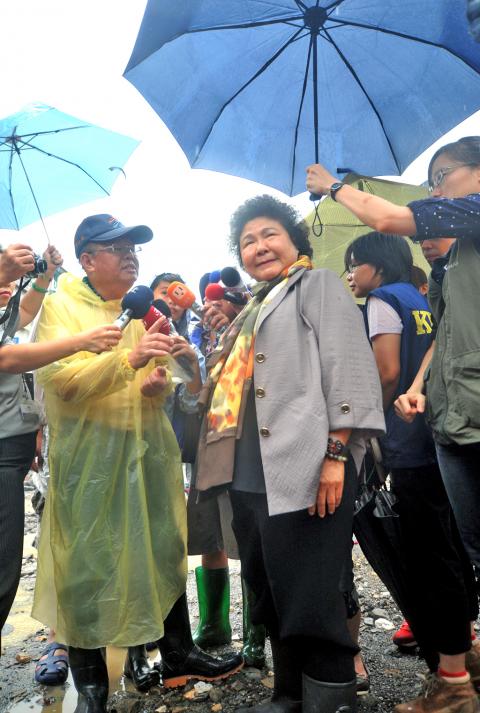Torrential rains that began early yesterday have delayed a plan by the Greater Kaohsiung Government to remove any remaining flammable gas inside a damaged pipeline that is believed to have caused explosions in the city on July 31 and Aug. 1.
According to the Central Weather Bureau, 246mm of rain fell in Kaohsiung’s Ciaotou District (橋頭) between 12am and 12pm yesterday, with more than 220mm falling in both Renwu (仁武) and Dashe (大社) districts.
The heavy rain flooded the streets caved in by the explosions, including the intersection of Kaisyuan and Ersheng roads in Cianjhen District (前鎮), where the pipeline, which is believed to be owned by LCY Chemical Corp (李長榮化學), was found to have been leaking at a section that crossed a drainage culvert prior to the blasts.

Photo: CNA
Prosecutors instructed engineers on Saturday to use a steel pipe to replace a cut-off segment of the pipeline that showed damage in an effort to speed up the removal from the line of flammable gas residues, including propene — which is believed to have caused the blasts.
Last week, prosecutors ordered that the segment of the pipeline be removed for testing to see if the damage had been caused by erosion or by the explosions, which killed 30 people and injured 310.
A plastic pipe was later used to reconnect the gas line, but was unable to withstand pumping pressure. The plastic pipe was originally set to be replaced today with a steel segment, but the work was delayed by flooding.

Photo: Huang Chih-yuan, Taipei Times
The Kaohsiung Environmental Protection Agency said the replacement work could not begin until the water level drops by at least 1m.
After the remaining propene, also known as propylene, in the pipe is cleared, investigators are to excavate the culvert to examine whether the pipeline suspected to be the source of the gas that led to the blasts was laid before or after the culvert’s construction, the Kaohsiung District Prosecutors’ Office said.
Underground pipelines should be packed within soil or other material and should not be exposed to air — as they were at the blast site at the point where they crossed the culvert — which can overly expose pipelines to air and moisture, leading to corrosion.
If the culvert in question is found to have been built after the pipeline’s installation, the city government might be held responsible for improper construction.
Meanwhile, Executive Yuan spokesperson Sun Lih-chyun (孫立群) said that Premier Jiang Yi-huah (江宜樺) has ordered preparations for a meeting with Kaohsiung Mayor Chen Chu (陳菊) to discuss enhancing safety in the petrochemical industry, adding that a date has not yet been decided for the two to meet.
Chen, a member of the Democratic Progressive Party, said on Saturday that she would like to meet with Jiang this week to talk about the hierarchy of responsibility between the central government and local authorities for regulating undergrounds pipelines owned by petrochemical companies in Kaohsiung.
However, Chen said yesterday that the situation at the disaster zone has been exacerbated by the rain in Kaohsiung and that she will wait until the situation improves before traveling to Taipei for a meeting with Jiang.

Seventy percent of middle and elementary schools now conduct English classes entirely in English, the Ministry of Education said, as it encourages schools nationwide to adopt this practice Minister of Education (MOE) Cheng Ying-yao (鄭英耀) is scheduled to present a report on the government’s bilingual education policy to the Legislative Yuan’s Education and Culture Committee today. The report would outline strategies aimed at expanding access to education, reducing regional disparities and improving talent cultivation. Implementation of bilingual education policies has varied across local governments, occasionally drawing public criticism. For example, some schools have required teachers of non-English subjects to pass English proficiency

‘FORM OF PROTEST’: The German Institute Taipei said it was ‘shocked’ to see Nazi symbolism used in connection with political aims as it condemned the incident Sung Chien-liang (宋建樑), who led efforts to recall Democratic Progressive Party (DPP) Legislator Lee Kun-cheng (李坤城), was released on bail of NT$80,000 yesterday amid an outcry over a Nazi armband he wore to questioning the night before. Sung arrived at the New Taipei City District Prosecutors’ Office for questioning in a recall petition forgery case on Tuesday night wearing a red armband bearing a swastika, carrying a copy of Adolf Hitler’s Mein Kampf and giving a Nazi salute. Sung left the building at 1:15am without the armband and apparently covering the book with a coat. This is a serious international scandal and Chinese

TRADE: The premier pledged safeguards on ‘Made in Taiwan’ labeling, anti-dumping measures and stricter export controls to strengthen its position in trade talks Products labeled “made in Taiwan” must be genuinely made in Taiwan, Premier Cho Jung-tai (卓榮泰) said yesterday, vowing to enforce strict safeguards against “origin laundering” and initiate anti-dumping investigations to prevent China dumping its products in Taiwan. Cho made the remarks in a discussion session with representatives from industries in Kaohsiung. In response to the US government’s recent announcement of “reciprocal” tariffs on its trading partners, President William Lai (賴清德) and Cho last week began a series of consultations with industry leaders nationwide to gather feedback and address concerns. Taiwanese and US officials held a videoconference on Friday evening to discuss the

PERSONAL DATA: The implicated KMT members allegedly compiled their petitions by copying names from party lists without the consent of the people concerned Judicial authorities searched six locations yesterday and questioned six people, including one elderly Chinese Nationalist Party (KMT) member and five KMT Youth League associates, about alleged signature forgery and fraud relating to their recall efforts against two Democratic Progressive Party (DPP) legislators. After launching a probe into alleged signature forgery and related fraud in the KMT’s recall effort, prosecutors received a number of complaints, including about one petition that had 1,748 signatures of voters whose family members said they had already passed away, and also voters who said they did not approve the use of their name, Taipei Deputy Chief Prosecutor